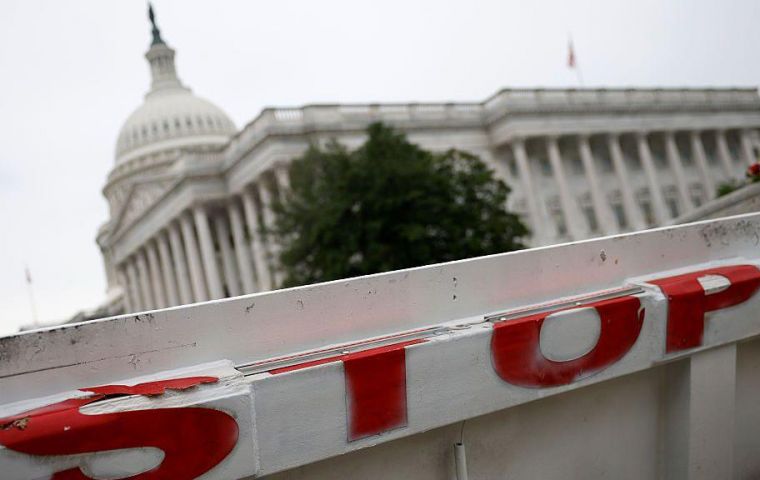MercoPress. South Atlantic News Agency
Deal reached in US Senate to end longest-ever Gov't shutdown
 A few formalities were still pending after the deal, it was reported in Washington DC
A few formalities were still pending after the deal, it was reported in Washington DC A bipartisan agreement was struck in the Senate on Sunday to end the longest federal government shutdown in U.S. history, a 40-day impasse that has crippled federal agencies and left hundreds of thousands of civil servants without pay.
The deal, negotiated by a moderate group of Democrats and Republicans, is expected to allow Congress to approve funding and reopen essential departments shortly. The tentative agreement, confirmed by multiple sources, centers on a strategy to advance funding bills while committing to a vote on the central sticking point of the shutdown: subsidies for the Affordable Care Act (ACA), known as Obamacare.
As per the deal, Congress is expected to approve budgeted funds for key departments, such as Agriculture and Veterans Affairs, through Jan. 30. In addition, the understanding ensures that approximately 650,000 furloughed Federal Worker Relief employees will receive back pay and reinstated to their positions, reversing layoff notices issued during the shutdown.
Moreover, Senate Majority Leader John Thune (R-SD) promised Democrats a vote in December on extending the ACA tax credits, which expire at the end of the year and which Democrats had made a prerequisite for ending the shutdown.
The compromise was enough to sway a critical number of moderate Senate Democrats, including Angus King (I-ME), Jeanne Shaheen (D-NH), and Maggie Hassan (D-NH). Senator Tim Kaine (D-VA) said the deal “guarantees a vote to extend Affordable Care Act premium tax credits, which Republicans weren't willing to do,” securing his support.
While Majority Leader Thune confirmed the Senate planned to vote on a funding measure Sunday night, the House of Representatives must still convene to formalize the end of the shutdown.
The government closure, which began due to a lack of agreement on extending the US budget, has caused extensive harm, including staffing shortages, leading to long delays at airports and significant disruptions to air travel across the country, as well as the closure of basic services and the non-payment of SNAP benefits (food stamps) for the poorest Americans.
Top economic advisors warned the protracted shutdown could lead to a “negative quarter” for the US economy, particularly disrupting the critical holiday travel and shopping season.
President Donald Trump, returning to the White House from Florida, told reporters late Sunday, “It looks like we're getting close to the shutdown ending.”
However, the president continued to aggressively push his vision for health care via social media, urging Senate Republicans to “end Obamacare” and arguing that funds used for the ACA should be sent directly to the American people rather than to “money sucking Insurance Companies.” This position remains a major source of friction with Democrats, who have insisted on protecting and extending the subsidies.




Top Comments
Disclaimer & comment rulesCommenting for this story is now closed.
If you have a Facebook account, become a fan and comment on our Facebook Page!